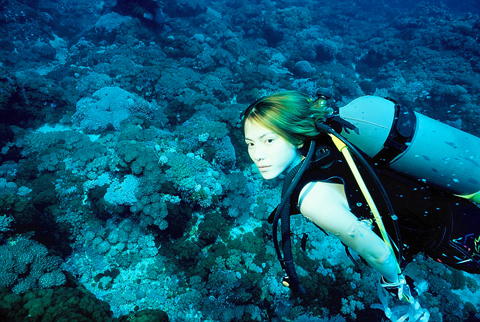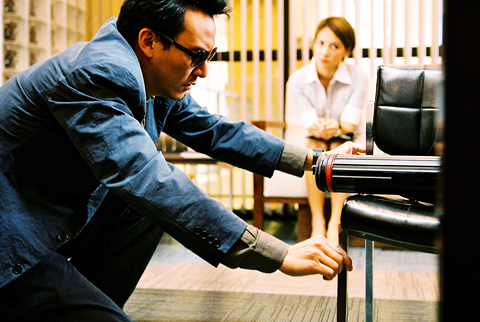The seabed stone formations discovered in the 1980s off Japan's Yonaguni Island, 111km directly east of Taiwan, have aroused controversy. Are they, as some theorists from the Morien Institute claim, the remains of an ancient culture? Or simply the work of natural processes? For filmmaker Tsui Hark (徐克), the mysterious structures provide a backdrop for Missing (謎屍), a romantic thriller starring Lee Sin-je (李心潔).
Despite a big-name cast, star director and enigmatic setting, the film suffers from a flabby storyline and vacillates unconvincingly between the romance and horror genres.
Lee plays Gao Jing, a psychologist living in Hong Kong who hits it off with underwater photographer Dave Chen (played by China's Guo Xiaodong, 郭曉冬).

PHOTO COURTESY OF STAR GROUP
Romance ensues, and Chen takes Gao on a diving trip to visit Yonaguni Island where he plans to propose to his true love.
But tragedy strikes on a dive when Chen loses his head. Literally.
Heartbroken and traumatized, Gao turns to hypnotherapy to retrieve the buried memories of what actually happened during the fateful dive.

PHOTO COURTESY OF STAR GROUP
Meanwhile, Chen's younger sister, Xiao Kai (Isabella Leong, 梁洛施), returns from Taiwan carrying a human head that she believes to be her deceased brother's and becomes possessed.
Gao's life spirals out of control when one of her patients, Simon (Chang Chen), convinces her of the existence of spirits. The psychologist finds it increasingly difficult to tell the difference between drug-induced visions, apparitions or illusions, as did this reviewer.
Missing opens with a promising premise but rapidly descends into convoluted plot devices with few genuine moments of horror, preventing viewers from suspending disbelief. There are unconvincing spirits, half-baked characters and an overwrought love story. Missing's end credits roll several anticlimaxes too late.
Taiwanese actor Chang Chen is one of the film's few pleasant surprises as he takes a break from his usual reticent leads to play an amusingly wacky sidekick.
Lee Sin-je, on the other hand, doesn't deviate from her usual scream queen expressions, and the deadpan Chang Chen-yue (張震嶽), who plays a marine archeologist, could have been left on the editing room floor without affecting the film's overall appeal.
Inspired by a documentary about the ancient underwater structures, Tsui reportedly spent three years and NT$300 million on Missing, which required advanced underwater cinematography equipment as well as a highly trained production team capable of underwater filmmaking. Though the effort involved is commendable, the results are not, which means the behind-the-scenes story of how the movie was filmed could be more enjoyable than the film itself.

This is the year that the demographic crisis will begin to impact people’s lives. This will create pressures on treatment and hiring of foreigners. Regardless of whatever technological breakthroughs happen, the real value will come from digesting and productively applying existing technologies in new and creative ways. INTRODUCING BASIC SERVICES BREAKDOWNS At some point soon, we will begin to witness a breakdown in basic services. Initially, it will be limited and sporadic, but the frequency and newsworthiness of the incidents will only continue to accelerate dramatically in the coming years. Here in central Taiwan, many basic services are severely understaffed, and

It is a soulful folk song, filled with feeling and history: A love-stricken young man tells God about his hopes and dreams of happiness. Generations of Uighurs, the Turkic ethnic minority in China’s Xinjiang region, have played it at parties and weddings. But today, if they download it, play it or share it online, they risk ending up in prison. Besh pede, a popular Uighur folk ballad, is among dozens of Uighur-language songs that have been deemed “problematic” by Xinjiang authorities, according to a recording of a meeting held by police and other local officials in the historic city of Kashgar in

Jan. 5 to Jan. 11 Of the more than 3,000km of sugar railway that once criss-crossed central and southern Taiwan, just 16.1km remain in operation today. By the time Dafydd Fell began photographing the network in earnest in 1994, it was already well past its heyday. The system had been significantly cut back, leaving behind abandoned stations, rusting rolling stock and crumbling facilities. This reduction continued during the five years of his documentation, adding urgency to his task. As passenger services had already ceased by then, Fell had to wait for the sugarcane harvest season each year, which typically ran from

The People’s Republic of China (PRC) was out in force in the Taiwan Strait this week, threatening Taiwan with live-fire exercises, aircraft incursions and tedious claims to ownership. The reaction to the PRC’s blockade and decapitation strike exercises offer numerous lessons, if only we are willing to be taught. Reading the commentary on PRC behavior is like reading Bible interpretation across a range of Christian denominations: the text is recast to mean what the interpreter wants it to mean. Many PRC believers contended that the drills, obviously scheduled in advance, were aimed at the recent arms offer to Taiwan by the